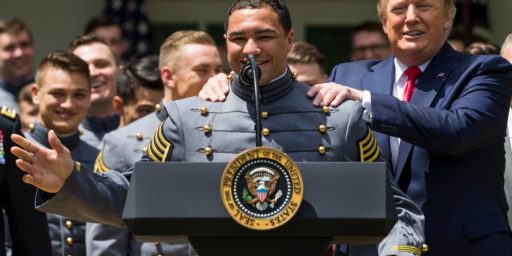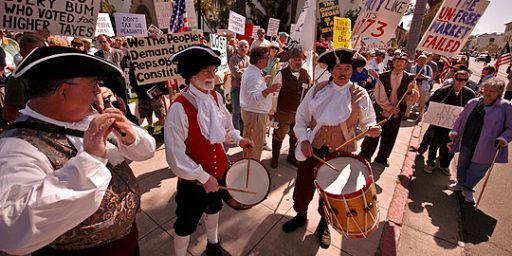Get Serious
Is the United States a serious country? Should we be?
Eugene Robinson urges us to be a more serious country:
China, for better or worse, is a serious country. The United States had better start acting like one.
I got a glimpse of the future Wednesday in the vast ballroom of a Washington hotel where hundreds of august dignitaries — and some journalists as well — gathered at a luncheon in honor of Vice President Xi Jinping, who is widely expected to become China’s top leader after a year-long transition.
[…]
China is a one-party state, but that does not mean there is no debate about the country’s direction. Xi is considered likely to keep the nation on its current path of free-market economic growth. His political adversary Bo Xilai advocates a more robust safety net to care for the millions who are being left out of the Chinese economic miracle.
There are also internal disagreements about how aggressive China should be in asserting its military influence throughout the region, especially in the South China Sea. Addressing the environmental cost of the country’s rapid development will be an urgent task for the incoming leadership. China’s records on human rights and political openness are still abysmal.
These are serious questions, but Chinese leaders at least are grappling with them in a serious manner. But here in the United States?
As any resident of the city of Chicago could tell you, one party rule is not sufficient to ensure that leaders deal with serious problems in a serious way. No, what it requires is the ability to ignore competing interests.
Rather than get lost in the weeds of what being serious would mean or whether China is, in fact, a serious country in the sense that Mr. Robinson is using, let’s focus on leadership. I think that China’s leaders are tougher and smarter than ours and with good reason.
Entry into the Chinese civil service system is by competitive examination. Promotion occurs through proven accomplishment rather than by campaigning for office. Using those criteria which of the following would have risen to the highest office in the land?
Barack Obama
George W. Bush
William Clinton
George H. W. Bush
Ronald Reagan
Jimmy Carter
Gerald Ford
Richard Nixon
Lyndon Johnson
John Kennedy
Dwight Eisenhower
Harry Truman
I think, arguably, none of them would. Perhaps the most serious candidate would have been George H. W. Bush (for whom I never voted for anything).
Should we be serious?






Meh…
No doubt we need to be more serious…the Faux Debt Ceiling Kerfuffle comes immediately to mind. Dreams of Tax Cuts paying for themselves are not far behind. Fantasies of nukular war with Iran and Israel as expressed yesterday on a bi-partisan basis certainly qualify.
How we even begin to get there is an excellent question.
Becoming a five-star general and the first Supreme Allied Commander, Europe wasn’t competitive?
I suppose it depends on what you mean by acomplishments. I would think Eisenhower by way of his military service would certainly have qualified. I agree with your assessment of George H.W. Bush. Clinton possibly based on his academic acomplishments and being a governor, but I doubt it.
The rest wouldn’t have made it.
Enlightened despotism is a great form of government….until it isn’t. I’m sure these Chinese leaders are “very serious” about maintaining their control of the state. As long as things go well for China, they can afford to appear like serious leaders. If things go south, and their authority is challenged, what will they do as “serious” leaders?
Despite his stellar later career, Eisenhower was a thoroughly average student at West Point. He’d’ve never made the grade to higher rank in a “serious” system.
@Dave Schuler: So academic rank is the sole characteristic that determines how good someone will be at a job? Using your methodology the future President should have been William E. R. Covell?
I should also point out that Ulysses S. Grant was graduated towards the bottom of his class, at 21st out of 39 graduates.
Dave,
Fighting a real war is not anything like succeeding at a service academy. Unlike the promotion system today, promotions during WWII rewarded ability and talent, not how well one did in an academic setting at West Point. By the serious standards that really mattered – life, death and the strategic future of a nation and a wartime alliance, Eisenhower was clearly exceptional. And the fact that Eisenhower graduated from staff college at the top of his class and made the rank of Brigadier General before WWII started says something about his abilities.
@Dave Schuler:
Are you suggesting this is a an inadequate method?
@James: I guess our Politburo should appoint whoever can get a majority of support from within its body.
@Timothy Watson: A reasonable point, but then that begs the question of who picks the Politburo, doesn’t it?
You talk about weeds Dave, but seem to leave us with your judgement of who was or was not serious … is the shorter “no, let me decide?”
@john personna: Exactly. This is silly. The Chinese government has, for years, both implicitly and explicitly used the threat of violence to maintain power. I find this “serious/unserious” dichotomy to be rather absurd.
Actually, that’s my point. So do I.
The question is not about how they pick their leaders, but how the leaders attempt to address the concerns of the country.
Eugene, lighten up.
@Hey Norm:
All examples of people taking themselves, and their ideas, too serious.
Wouldn’t it make more sense to discuss seriousness in terms of Congressional malfunction or the Primary circus?
@Timothy Watson: Actually, this might be closer to what our founders intended than what we have today, with the electoral college standing in for the Politburo.
Considering where Robinson falls on the ideological spectrum, it seems obvious what he is talking about…the GOP presidential clown car, the disastrous Republican leadership in Congress, etc….
Yeah, pass.
I mean, maybe more rigor in our civil service, fine. But even though our electoral politics is often a clownshow, I’ll keep it. Worst but for the other options.